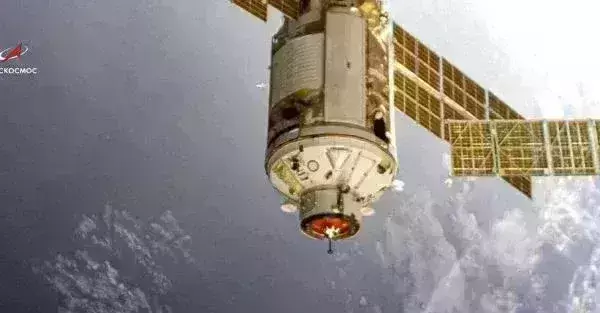
International Space Station spins out of control after Russian module misfires
text_fieldsThe International Space Station (ISS) was briefly thrown out of its position on Thursday, 29 July, after a Russian research module that had been sent to the space station started firing its thrusters unexpectedly.
There were seven crew members, including two Russian cosmonauts, a Japanese astronaut, a European space agency astronaut and three NASA astronauts aboard the space station when the incident took place. According to NASA and RIA, the orbiting lab suffered no damage and none of the seven crew members aboard was hurt.
Joel Montalbano, manager of NASA's space station program said in a conference that: "There was no immediate danger at any time to the crew, (they) didn't feel any movement."
Russia's Nauka module is a 23-ton self-contained unit comprising a laboratory unit, sleeping quarters for one astronaut, and water purifying equipment that was added to the Russian segment of the International Space Station. The module was launched on July 21 and took 8 days to reach the I.S.S., where it was due to dock. The module was fashioned by Russian space agency Roscosmos.
The Nauka module replaced Russia's Pirs module, which was detached from the I.S.S. on Monday, July 26. Nauka, which means 'science' in Russia, will be the country's main research laboratory on the space station.
The module docked onto the orbiting outpost on Thursday at 9:29 AM ET, according to The New York Times. At 12:34 PM ET, Nauka's thrusters suddenly began firing, which twisted the orientation of the space station. It took 45 minutes to get the situation under control, with communications with the crew members being disrupted twice, for four minutes and seven minutes respectively.
At its peak, the incident caused the space station to spin by half a degree per second. After the whole ordeal, the I.S.S. is reported to have spun from its original orientation by 45 degrees. Ultimately, Nauka's engines were turned off, and other thrusters were fired by controllers to get the space station back to its original position.
Roscosmos has stated that they will look into the cause of the module malfunction while NASA engineers evaluate any damage on the I.S.S. Montalbano stated that: "Right now, we haven't noticed any damage to the I.S.S.," reported The New York Times.
In light of the incident, NASA has postponed the launch of Boeing's new CST-100 Starliner capsule from Friday to Tuesday. The Starliner was due to be launched on Friday from the Kennedy Space Center in Florida.























